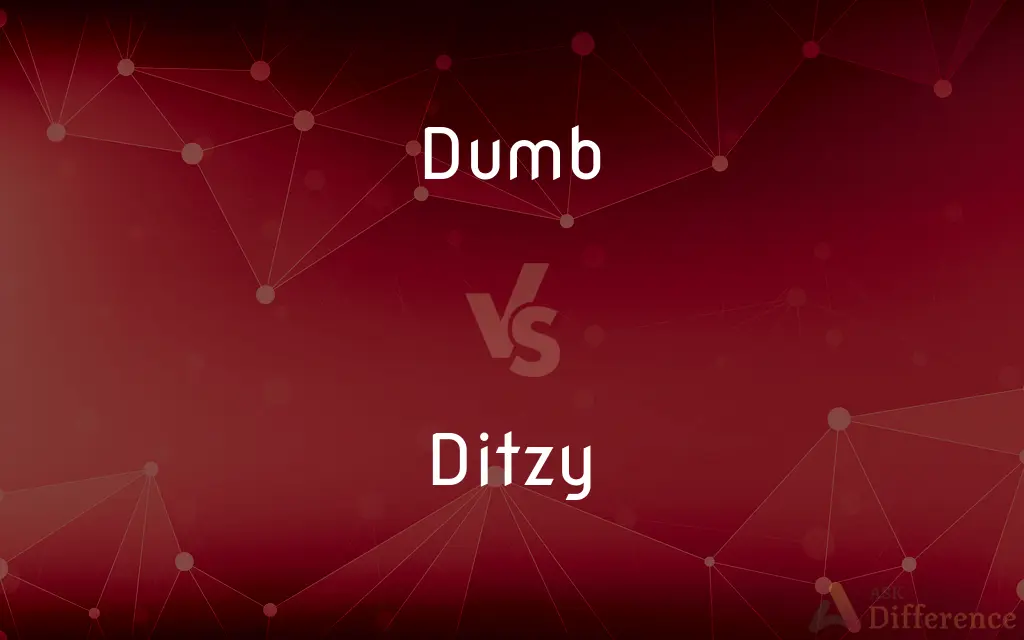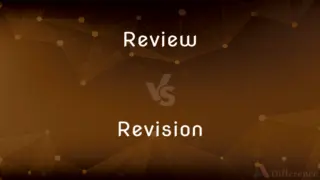Dumb vs. Ditzy — What's the Difference?
Edited by Tayyaba Rehman — By Maham Liaqat — Updated on April 4, 2024
Dumb implies a lack of intelligence or understanding, often seen as offensive. Ditzy suggests scatterbrained or lacking seriousness, typically used in a lighter, less harsh context.

Difference Between Dumb and Ditzy
Table of Contents
ADVERTISEMENT
Key Differences
Dumb is a term that historically signifies an inability to speak but has evolved to colloquially imply a lack of intelligence or understanding. It is often used derogatorily and can be seen as offensive. In contrast, ditzy describes someone who is scatterbrained or not overly serious, frequently portrayed with a sense of endearment or humor rather than sharp criticism.
While "dumb" can be applied to anyone regardless of context, implying a general shortfall in cognitive abilities or knowledge, "ditzy" is often gendered and used to describe behavior rather than inherent ability. It suggests moments of forgetfulness or silliness rather than an overall judgment on one’s intelligence.
The perception of someone as dumb might lead to broader social and personal implications, potentially affecting one's opportunities and self-esteem. On the other hand, being described as ditzy often carries lighter social stigmas, sometimes associated with a carefree or whimsical personality, rather than a serious character flaw.
Usage of the term "dumb" in social situations can be more hurtful and lasting, as it questions an individual's fundamental capacity to learn or understand. Meanwhile, "ditzy" might be used more casually among friends to tease someone about a momentary lapse or silly mistake, without implying deeper intellectual deficiencies.
The origins of "dumb" reflect its harsher connotations, stemming from the Old English "dumb," meaning unable to speak and, by extension, lacking intellectual depth. "Ditzy," however, lacks such a historically heavy background and is a relatively modern addition to the language, reflecting its lighter, more playful usage.
ADVERTISEMENT
Comparison Chart
Connotation
Negative, implying lack of intelligence.
Light-hearted, suggesting silliness.
Usage
Derogatory and often seen as offensive.
Casual and less harsh.
Gender Association
Neutral, can describe any gender.
Often gendered, typically describing females.
Social Implications
Can be damaging to one's self-esteem and opportunities.
Generally seen as whimsical or carefree.
Origin
Old English "dumb," meaning unable to speak.
Modern, without a heavy historical background.
Compare with Definitions
Dumb
Lacking intelligence or good judgment.
Calling someone dumb over a simple mistake is harsh.
Ditzy
Scatterbrained or lightly foolish.
She laughed off her ditzy moment of forgetting the keys.
Dumb
Not designed to process information.
A dumb terminal relies entirely on the central server.
Ditzy
Showing a lack of focus or seriousness.
The ditzy character in the play brought comic relief.
Dumb
Reflecting poor decision-making.
Taking that risk without preparation was really dumb.
Ditzy
Prone to making silly mistakes.
Her ditzy mistakes at work became endearing stories.
Dumb
Showing a lack of understanding.
Ignoring the warning signs was a dumb decision.
Ditzy
Not serious or flighty.
His ditzy demeanor keeps the mood light.
Dumb
Unable to speak.
Historically, dumb was used to describe someone who was mute.
Ditzy
Characterized by a whimsical or carefree attitude.
Her ditzy charm won over the audience.
Dumb
Lacking the power of speech. Used of animals and inanimate objects.
Ditzy
Silly or scatterbrained
Don't tell me my ditzy secretary didn't send you an invitation!
Dumb
(Offensive) Incapable of using speech; mute. Used of humans. See Usage Note at mute.
Ditzy
Eccentric or scatterbrained
"acting like a ditzy dame in one of Shakespeare's comedies" (Stephen Wells).
Dumb
Temporarily speechless, as with shock or fear
I was dumb with disbelief.
Ditzy
(informal) Silly or scatterbrained, usually of a young woman.
Dumb
Unwilling to speak; taciturn.
Dumb
Not expressed or articulated in sounds or words
Dumb resentment.
Dumb
(Nautical) Not self-propelling.
Dumb
Conspicuously unintelligent; stupid
Dumb officials.
A dumb decision.
Dumb
Unintentional; haphazard
Dumb luck.
Dumb
To make silent or dumb.
Dumb
(dated) Unable to speak; lacking power of speech (kept in "deaf, dumb, and blind").
His younger brother was born dumb, and communicated with sign language.
Dumb
(dated) Silent; unaccompanied by words.
Dumb show
Dumb
Extremely stupid.
You are so dumb! You don't even know how to make toast!
Dumb
(figuratively) Pointless, foolish, lacking intellectual content or value.
This is dumb! We're driving in circles! We should have asked for directions an hour ago!
Brendan had the dumb job of moving boxes from one conveyor belt to another.
Dumb
Lacking brightness or clearness, as a colour.
Dumb
To silence.
Dumb
(transitive) To make stupid.
Dumb
(transitive) To represent as stupid.
Dumb
(transitive) To reduce the intellectual demands of.
Dumb
Destitute of the power of speech; unable; to utter articulate sounds; as, the dumb brutes.
To unloose the very tongues even of dumb creatures.
Dumb
Not willing to speak; mute; silent; not speaking; not accompanied by words; as, dumb show.
This spirit, dumb to us, will speak to him.
To pierce into the dumb past.
Dumb
Lacking brightness or clearness, as a color.
Her stern was painted of a dumb white or dun color.
Dumb
To put to silence.
Dumb
Slow to learn or understand; lacking intellectual acuity;
So dense he never understands anything I say to him
Never met anyone quite so dim
Although dull at classical learning, at mathematics he was uncommonly quick
Dumb officials make some really dumb decisions
He was either normally stupid or being deliberately obtuse
Worked with the slow students
Dumb
Unable to speak temporarily;
Struck dumb
Speechless with shock
Dumb
Lacking the power of human speech;
Dumb animals
Dumb
Unable to speak because of hereditary deafness
Common Curiosities
What does being called dumb imply?
It implies a judgment on one's intelligence or understanding, often negatively.
Is it acceptable to use ditzy in formal settings?
Given its casual nature, it might be seen as unprofessional in formal contexts.
Is ditzy a negative term?
While it suggests a lack of seriousness, it's generally used in a lighter, less harsh manner.
How should one respond to being called either term?
Responses vary, but addressing the intent and context can help clarify or diffuse potential offense.
Are there better alternatives to using these terms?
Yes, using more specific and less loaded language can convey similar ideas more constructively.
How does gender play a role in the use of ditzy?
It's often used to describe females, reflecting a gender bias in perceptions of silliness or seriousness.
What impact does calling someone dumb have?
It can significantly affect their self-esteem and opportunities by casting doubt on their intellectual capacity.
Can the term dumb be used in a non-offensive way?
Its primary use has negative connotations, making it difficult to employ without offense.
What kind of behavior does ditzy describe?
It describes scatterbrained or whimsical behavior, often seen as endearing rather than critically lacking.
Why is dumb considered more offensive than ditzy?
"Dumb" attacks a person's fundamental abilities, while "ditzy" typically refers to momentary or minor lapses.
Can ditzy behavior be intentional?
Sometimes, it might be adopted as a playful or humorous persona.
Does the context matter when using these terms?
Absolutely, as the impact and acceptability of both terms can vary greatly with context.
Can a person be both dumb and ditzy?
While they refer to different traits, societal perceptions might overlap them based on behavior.
How has the use of dumb evolved over time?
While it once meant unable to speak, it has come to broadly imply a lack of intelligence.
How do cultural perceptions influence the understanding of dumb and ditzy?
Cultural norms and values shape the acceptability and interpretations of these terms, affecting their perceived offensiveness and usage.
Share Your Discovery

Previous Comparison
Calamari vs. Squid
Next Comparison
Review vs. RevisionAuthor Spotlight
Written by
Maham LiaqatEdited by
Tayyaba RehmanTayyaba Rehman is a distinguished writer, currently serving as a primary contributor to askdifference.com. As a researcher in semantics and etymology, Tayyaba's passion for the complexity of languages and their distinctions has found a perfect home on the platform. Tayyaba delves into the intricacies of language, distinguishing between commonly confused words and phrases, thereby providing clarity for readers worldwide.
















































